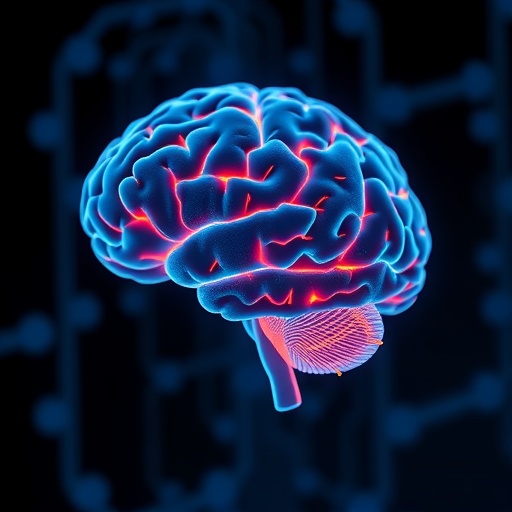In a groundbreaking new study published in BMC Psychiatry, researchers have unveiled compelling evidence of altered cortical activation and disrupted functional connectivity in patients suffering from chronic insomnia, shedding new light on the neural underpinnings of working memory deficits associated with this pervasive sleep disorder. Using cutting-edge multi-channel functional near-infrared spectroscopy (fNIRS) technology, this investigation offers unprecedented insight into how insomnia impacts brain function during cognitively demanding tasks, with significant implications for understanding and eventually treating the cognitive impairments tied to poor sleep.
Chronic insomnia, characterized by persistent difficulties in initiating or maintaining sleep, afflicts millions worldwide and has long been linked to deficits in attention and memory. While previous studies suggested that insomnia impairs working memory—a cognitive system essential for temporarily holding and manipulating information—the precise neural mechanisms behind this impairment have remained elusive. This new research focused on delineating changes in cortical activation and inter-regional brain communication during working memory tasks, specifically focusing on the frontotemporal network widely implicated in cognitive control and executive function.
The study recruited 88 adults diagnosed with chronic insomnia alongside 84 healthy controls, creating a robust sample for comparisons. Participants engaged in a specially designed working memory task that required them to memorize and respond to visual stimuli comprising different graphics and colors. This task was methodologically divided into segments including baseline, working memory stimulation, working memory exploration, and a non-working memory exploration phase, thereby enabling fine-grained analysis of brain activity during specific cognitive demands.
Functional near-infrared spectroscopy was employed to measure oxygenated hemoglobin (Oxy-Hb) concentration changes in the frontotemporal cortex—an indicator of localized brain activation. This non-invasive imaging technique offers high temporal resolution and enables realtime observation of hemodynamic responses across multiple channels simultaneously. By focusing on bilateral regions of the medial prefrontal cortex (mPFC) and dorsolateral prefrontal cortex (DLPFC), areas known to be crucial for working memory processing, the researchers could explore both the amplitude of activation and the functional connectivity between these regions.
The results revealed striking differences between the insomnia group and healthy controls. Behaviorally, individuals with chronic insomnia exhibited significantly lower task accuracy during working memory challenges, reinforcing the clinical observation that sleep disruption negatively affects cognitive performance. On a neural level, the fNIRS data demonstrated markedly reduced oxyhemoglobin changes in both bilateral mPFC and DLPFC regions among insomniacs during task stimulation phases, reflecting diminished cortical engagement in these critical areas.
Importantly, the study also highlighted widespread alterations in brain connectivity patterns. The average connection strength between fNIRS channels—proxy measures for functional connectivity—was notably lower in patients with chronic insomnia compared to controls. Further analyses pinpointed specific pairs of brain regions where connection strengths were significantly compromised, suggesting a breakdown in network integrity that likely underlies cognitive difficulties during working memory tasks.
This diminished synchronization within frontotemporal networks brings to the forefront the concept that insomnia does not merely reduce brain activity in isolated regions but disrupts the cohesive communication essential for efficient cognitive function. Such findings align with a growing body of evidence that neuropsychiatric disorders, including sleep disturbances, often manifest as network-level dysfunction rather than focal pathology.
The implications of these findings are profound. Chronic insomnia may lead to neurophysiological changes that impair the brain’s ability to process and integrate information dynamically, resulting in the common but poorly understood working memory deficits experienced by patients. This study’s objective, quantifiable evidence challenges previous assumptions that cognitive impairments in insomnia are primarily secondary to fatigue or mood disturbances, instead suggesting direct neural alterations.
Moreover, the application of multi-channel fNIRS technology in this context provides a scalable and accessible avenue for future research and clinical evaluation. Being portable and less resource-intensive than traditional neuroimaging techniques such as fMRI, fNIRS could facilitate broader diagnostic assessments and monitoring of brain function in diverse populations affected by sleep disorders.
Researchers also speculated that the decreased activation and disrupted connectivity observed may reflect a state of inefficient or fatigued neural networks struggling to compensate during demanding cognitive tasks. Such neural inefficiency could exacerbate cognitive complaints reported by insomnia patients, impacting daily functioning and quality of life.
Beyond the immediate clinical relevance, these findings intersect intriguingly with broader neuroscientific inquiries into how sleep modulates brain plasticity, network remodeling, and cognitive resilience. Given that working memory is foundational not only for higher cognitive processes but also for emotional regulation and decision-making, unraveling how insomnia impairs these systems could pave the way for targeted interventions.
Potential therapeutic approaches might include cognitive-behavioral therapies tailored to bolster working memory performance, pharmacologic agents aimed at modulating prefrontal cortical activity, or neuromodulation techniques designed to restore healthy connectivity patterns. Future research could also explore whether improvements in sleep quality consistently reverse neural dysfunction or if chronicity leads to irreversible changes.
In summary, this pioneering study published in BMC Psychiatry provides the most detailed view to date of how chronic insomnia disrupts brain function related to working memory. By establishing a clear link between reduced cortical activation, impaired functional connectivity, and diminished task performance, it not only confirms prior hypotheses but also charts new territory for understanding the neurocognitive consequences of persistent sleep disturbances. As insomnia continues to rise globally, such insights are vital to developing evidence-based strategies to preserve cognitive health and enhance patient outcomes.
Subject of Research:
Cortical activation and functional connectivity in relation to working memory impairments in patients with chronic insomnia.
Article Title:
Cortical activation and functional connectivity in patients with chronic insomnia based on working memory tasks: a multi-channel near-infrared spectroscopy study
Article References:
Zhou, Q., Yu, C., Liu, Z. et al. Cortical activation and functional connectivity in patients with chronic insomnia based on working memory tasks: a multi-channel near-infrared spectroscopy study. BMC Psychiatry 25, 788 (2025). https://doi.org/10.1186/s12888-025-07177-5
Image Credits: AI Generated




